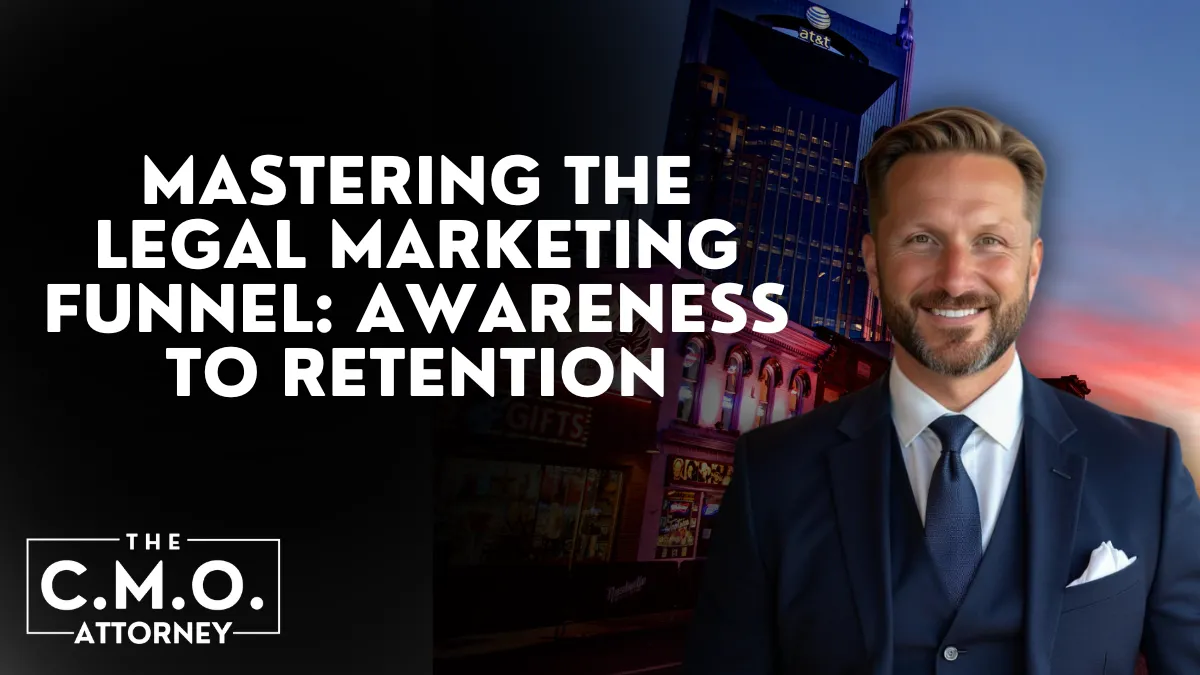 The Power of Geofencing Marketing for Attorneys
The Power of Geofencing Marketing for Attorneys
Geofencing marketing for attorneys stands out as a revolutionary strategy to capture highly targeted leads and convert them into clients. Using GPS, RFID, Wi-Fi, and cellular data, law firms can define precise geographic boundaries and deliver personalized mobile ads to potential clients in real time. This hyper-localized targeting ensures your advertising dollars are spent reaching people who truly need your legal expertise—right when and where it matters most.
At The CMO Attorney, we specialize in crafting bespoke geofencing marketing for attorneys campaigns that drive measurable growth. Our approach helps law firms dominate their local markets by engaging prospects in meaningful, location-specific moments.
Want to skip the reading and get some free insight? Sign up for a free consultation and explore how a fractional CMO can change your firm’s trajectory.
What Is Geofencing Marketing for Attorneys?
Geofencing marketing for attorneys involves creating virtual geographic perimeters—or “fences”—around specific locations. When a mobile user enters this zone, they become eligible to receive your law firm’s targeted ads on apps, social media, or websites. These ads can be tailored to the user’s location, legal needs, and browsing behavior, making them highly relevant and compelling.
Locations commonly targeted include:
-
Accident-prone intersections and highways
-
Hospitals and emergency rooms
-
Courthouses and legal buildings
-
Competitor law firms’ offices
By delivering timely, contextually relevant ads, law firms can capture client interest at the critical moment when legal assistance is top of mind.
Why Attorneys Must Use Geofencing in 2025
The legal market is more competitive than ever, and generic advertising no longer delivers the ROI attorneys expect. Geofencing marketing for attorneys provides several critical advantages:
-
Precision Targeting: Reach only those individuals physically near relevant locations who are likely to need legal services.
-
Immediate Engagement: Deliver ads while potential clients are experiencing events that prompt legal action (e.g., after a car accident or during court visits).
-
Competitive Conquesting: Target people who visit competitor offices, offering them reasons to switch to your firm.
-
Actionable Analytics: Gain rich insights on ad impressions, in-fence visits, and conversion rates to continually optimize campaigns.
Key Use Cases for Geofencing Marketing for Attorneys
Courthouse and Jail Targeting
Lawyers can target people attending court hearings, family members of defendants, or those seeking criminal defense. Geofencing near courthouses and jails connects your firm with users at moments of acute legal need, providing an immediate call to action.
Hospital and Emergency Room Targeting
Personal injury and medical malpractice attorneys gain a crucial advantage by geofencing hospitals and urgent care centers. Potential clients checking in after accidents or injuries can be served ads offering free case evaluations, capitalizing on their urgent legal needs.
Competitor Office Conquesting
By drawing fences around competing law firms, attorneys can reach prospects who are actively seeking legal services elsewhere. This tactic allows your firm to position itself as a better alternative, increasing client acquisition through targeted messaging.
Legal Conferences and Events
Fencing areas around legal seminars and expos allows firms to network effectively, generate leads, and promote specialty services to an engaged professional audience.
How The CMO Attorney Executes Winning Geofencing Campaigns
Our process is designed to deliver maximum ROI and measurable results:
Step 1: Location Strategy
We collaborate with your team to identify high-value geographic areas—hospitals, accident hotspots, courthouses, or competitor offices.
Step 2: Geofence Setup
Our experts create custom polygons precisely mapped to these areas, leveraging GPS, Wi-Fi, and cellular signals to define effective fences.
Step 3: Ad Deployment
Once users enter the geofence, we serve tailored ads across Google Display Network, Facebook, Instagram, and in-app environments, driving high conversion rates.
Step 4: Retargeting
Users continue to see your ads for up to 30 days post-visit, reinforcing your brand and increasing the chance they’ll take action.
Step 5: Analytics and Optimization
We provide transparent dashboards showing impressions, clicks, visits, and conversions, continuously optimizing your campaigns for peak performance.
Legal Compliance and Privacy Considerations
At The CMO Attorney, we rigorously ensure all geofencing marketing for attorneys complies with bar association advertising rules, HIPAA, GDPR, CCPA, and other relevant privacy laws. Ethical and legal compliance preserves your firm’s reputation while harnessing geofencing’s power.
Integrating Geofencing Marketing for Attorneys with CRM Systems
For true impact, geofencing marketing for attorneys must connect seamlessly to your firm’s Client Relationship Management (CRM) system. This integration automates lead capture, lead scoring, and follow-up, turning mobile ad impressions into consults and signed cases.
CRM integration benefits include:
-
Lead Scoring: Prioritize leads from geofencing based on engagement, improving intake efficiency.
-
Attribution Tracking: Understand which locations and ads drive the best results.
-
Personalized Follow-Up: Deliver targeted emails and retargeting ads tailored to the lead’s unique situation.
-
Unified Reporting: Consolidate geofencing data with overall marketing metrics for strategic decision-making.
This integration is a cornerstone of how The CMO Attorney delivers consistent client acquisition growth.
James Frazier | The CMO Attorney | Fractional CMO for Law Firms
Client Success Story
A Florida personal injury law firm came to us struggling with traditional Google Ads that delivered limited leads. After launching a geofencing campaign targeting five hospitals and three major accident intersections, the results were immediate:
-
400% increase in mobile ad impressions in the first month
-
25 new qualified phone calls within 10 days
-
Five new signed auto accident cases within three weeks
This success highlights how geofencing marketing for attorneys can turn mobile users into new clients quickly.
Get Started Today with The CMO Attorney
Geofencing marketing for attorneys is the future of local legal advertising. Don’t miss the opportunity to connect with potential clients precisely when they need you.
Sign up for a free consultation with The CMO Attorney to develop a location-based advertising campaign that will expand your firm’s reach and drive sustainable growth.
Sources
-
Statista – Mobile Advertising Spend
Detailed statistics on the rising dominance of mobile and location-based advertising in the U.S. market.
Statista Mobile Ad Spend Report -
Think with Google – Micro-Moments and Local Intent
Insightful research into consumer mobile behaviors and the importance of reaching users during critical decision-making moments.
Think with Google: Micro-Moments -
Tech Target – Geofencing Explained
Comprehensive explanation of geofencing technology, marketing benefits, and applications across industries, including legal services.
Guide to Geofencing



 Law firm marketing case studies have become essential for demonstrating what truly works. At
Law firm marketing case studies have become essential for demonstrating what truly works. At 
 Want to skip the reading and get some free insight?
Want to skip the reading and get some free insight? 
 The Rise of AI in Legal Marketing
The Rise of AI in Legal Marketing
 Having a sophisticated legal marketing funnel strategy is essential for law firms aiming to attract, convert, and retain clients effectively. At
Having a sophisticated legal marketing funnel strategy is essential for law firms aiming to attract, convert, and retain clients effectively. At